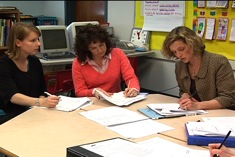A few years ago we took a course that we loved based on the book Data Wise: A Step-by-Step Guide to Using Assessment Results to Improve Teaching And Learning by Kathryn Parker...
Membership Required
The rest of this content is restricted to Choice Literacy members.
Join us today for instant access and member-only features:
Articles
Get full access to all Choice Literacy article content
Videos
Get full access to all Choice Literacy video content
Product Discounts
Receive members-only product discounts for online courses, DVDs, books and more
Membership Options










